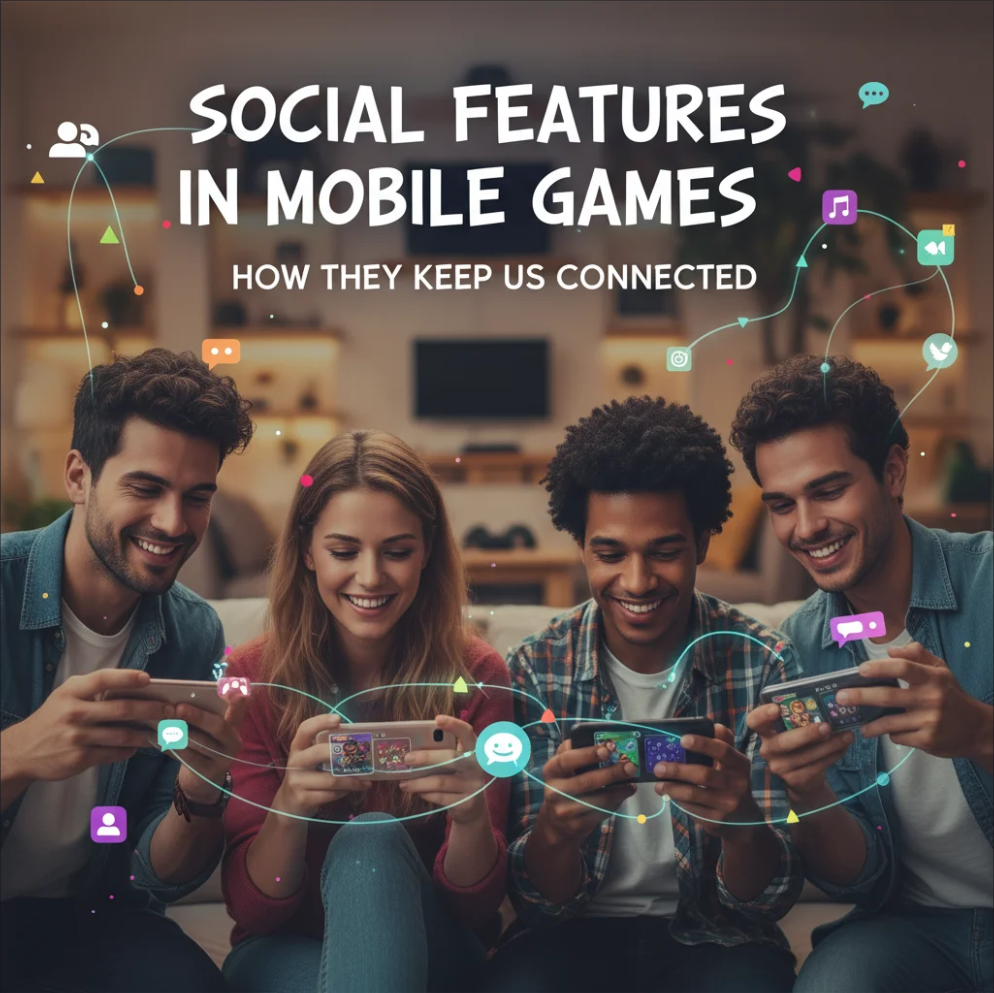Mobile games are no longer just about passing time or chasing high scores—they’ve evolved into social platforms that connect millions of players worldwide. From chat systems and friend lists to multiplayer battles and live events, social features play a central role in how we experience gaming today. But what exactly makes these features so powerful, and why do they keep us coming back? Let’s explore.
🔹 The Rise of Social Gaming
The shift from solo gaming to connected play has transformed mobile games into global communities. Developers realized that adding social features not only improves engagement but also builds loyalty. Whether you’re teaming up with friends or competing against strangers, the experience feels more personal and rewarding.
🔹 Popular Social Features in Mobile Games
1. Multiplayer Modes
- Real-time battles (e.g., MOBA or battle royale games) let players collaborate or compete with others around the world.
- Cooperative missions encourage teamwork, strategy, and friendship building.
2. Friends & Guild Systems
- Adding friends or joining guilds provides a sense of belonging.
- Guilds often unlock exclusive rewards, events, and chat systems.
3. In-Game Chat & Voice Communication
- Real-time chat and voice features make coordination easier.
- Social interaction enhances immersion and makes gaming more interactive.
4. Social Media Integration
- Many mobile games allow sharing achievements directly to platforms like Facebook, Instagram, or TikTok.
- This creates a sense of pride and community visibility, motivating players to keep playing.
5. Events & Leaderboards
- Seasonal events bring communities together with limited-time rewards.
- Leaderboards fuel healthy competition and encourage players to improve their skills.
🔹 Why Social Features Keep Us Hooked
- Human Connection – Playing with or against others satisfies our need for interaction.
- Competition & Achievement – Leaderboards and rankings give players goals to chase.
- Teamwork & Collaboration – Co-op features strengthen bonds and keep players engaged.
- Shared Experiences – Social play creates stories, memories, and even friendships that last beyond the game.
- Motivation to Return – Players are more likely to log in daily if their friends or guilds rely on them.
🔹 The Psychology Behind Social Gaming
- FOMO (Fear of Missing Out): Limited-time events push players to participate to avoid being left behind.
- Community Belonging: Games with guilds or clans mimic real-world social groups, fostering loyalty.
- Positive Reinforcement: Likes, gifts, and team achievements release dopamine, making the experience rewarding.
🔹 The Future of Social Features in Mobile Games
Looking ahead, social gaming will only get stronger. Expect to see:
- Deeper cross-platform play between consoles, PCs, and mobile devices.
- AR/VR social experiences that blend real-world interaction with gaming.
- AI-driven personalization that recommends friends, guilds, and events based on behavior.
✨ Final Thought
Mobile gaming isn’t just entertainment anymore—it’s a social network of its own. From teamwork and competition to friendships and communities, social features keep us engaged, motivated, and connected. The next time you log in to a mobile game, remember: it’s not just about winning; it’s about sharing the journey with others.🔹 The Rise of Social Gaming
The shift from solo gaming to connected play has transformed mobile games into global communities. Developers realized that adding social features not only improves engagement but also builds loyalty. Whether you’re teaming up with friends or competing against strangers, the experience feels more personal and rewarding.
🔹 Popular Social Features in Mobile Games
1. Multiplayer Modes
- Real-time battles (e.g., MOBA or battle royale games) let players collaborate or compete with others around the world.
- Cooperative missions encourage teamwork, strategy, and friendship building.
2. Friends & Guild Systems
- Adding friends or joining guilds provides a sense of belonging.
- Guilds often unlock exclusive rewards, events, and chat systems.
3. In-Game Chat & Voice Communication
- Real-time chat and voice features make coordination easier.
- Social interaction enhances immersion and makes gaming more interactive.
4. Social Media Integration
- Many mobile games allow sharing achievements directly to platforms like Facebook, Instagram, or TikTok.
- This creates a sense of pride and community visibility, motivating players to keep playing.
5. Events & Leaderboards
- Seasonal events bring communities together with limited-time rewards.
- Leaderboards fuel healthy competition and encourage players to improve their skills.
🔹 Why Social Features Keep Us Hooked
- Human Connection – Playing with or against others satisfies our need for interaction.
- Competition & Achievement – Leaderboards and rankings give players goals to chase.
- Teamwork & Collaboration – Co-op features strengthen bonds and keep players engaged.
- Shared Experiences – Social play creates stories, memories, and even friendships that last beyond the game.
- Motivation to Return – Players are more likely to log in daily if their friends or guilds rely on them.
🔹 The Psychology Behind Social Gaming
- FOMO (Fear of Missing Out): Limited-time events push players to participate to avoid being left behind.
- Community Belonging: Games with guilds or clans mimic real-world social groups, fostering loyalty.
- Positive Reinforcement: Likes, gifts, and team achievements release dopamine, making the experience rewarding.
🔹 The Future of Social Features in Mobile Games
Looking ahead, social gaming will only get stronger. Expect to see:
- Deeper cross-platform play between consoles, PCs, and mobile devices.
- AR/VR social experiences that blend real-world interaction with gaming.
- AI-driven personalization that recommends friends, guilds, and events based on behavior.
✨ Final Thought
Mobile gaming isn’t just entertainment anymore—it’s a social network of its own. From teamwork and competition to friendships and communities, social features keep us engaged, motivated, and connected. The next time you log in to a mobile game, remember: it’s not just about winning; it’s about sharing the journey with others.
Tags: MobileGames, Multiplayer, SocialGaming